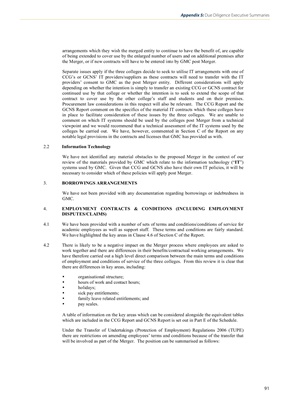
arrangements which they wish the merged entity to continue to have the benefit of, are capable
of being extended to cover use by the enlarged number of users and on additional premises after
the Merger, or if new contracts will have to be entered into by GMC post Merger.
Separate issues apply if the three colleges decide to seek to utilise IT arrangements with one of
CCG's or GCNS' IT providers/suppliers as these contracts will need to transfer with the IT
providers' consent to GMC as the post Merger entity. Different considerations will apply
depending on whether the intention is simply to transfer an existing CCG or GCNS contract for
continued use by that college or whether the intention is to seek to extend the scope of that
contract to cover use by the other college's staff and students and on their premises.
Procurement law considerations in this respect will also be relevant. The CCG Report and the
GCNS Report comment on the specifics of the material IT contracts which these colleges have
in place to facilitate consideration of these issues by the three colleges. We are unable to
comment on which IT systems should be used by the colleges post Merger from a technical
viewpoint and we would recommend that a technical assessment of the IT systems used by the
colleges be carried out. We have, however, commented in Section C of the Report on any
notable legal provisions in the contracts and licenses that GMC has provided us with.
2.2 Information Technology
We have not identified any material obstacles to the proposed Merger in the context of our
review of the materials provided by GMC which relate to the information technology ("IT")
systems used by GMC. Given that CCG and GCNS also have their own IT policies, it will be
necessary to consider which of these policies will apply post Merger.
3. BORROWINGS ARRANGEMENTS
We have not been provided with any documentation regarding borrowings or indebtedness in
GMC.
4. EMPLOYMENT CONTRACTS & CONDITIONS (INCLUDING EMPLOYMENT
DISPUTES/CLAIMS)
4.1 We have been provided with a number of sets of terms and conditions/conditions of service for
academic employees as well as support staff. These terms and conditions are fairly standard.
We have highlighted the key areas in Clause 4.6 of Section C of the Report.
4.2 There is likely to be a negative impact on the Merger process where employees are asked to
work together and there are differences in their benefits/contractual working arrangements. We
have therefore carried out a high level direct comparison between the main terms and conditions
of employment and conditions of service of the three colleges. From this review it is clear that
there are differences in key areas, including:
• organisational structure;
• hours of work and contact hours;
• holidays;
• sick pay entitlements;
• family leave related entitlements; and
• pay scales.
A table of information on the key areas which can be considered alongside the equivalent tables
which are included in the CCG Report and GCNS Report is set out in Part E of the Schedule.
Under the Transfer of Undertakings (Protection of Employment) Regulations 2006 (TUPE)
there are restrictions on amending employees' terms and conditions because of the transfer that
will be involved as part of the Merger. The position can be summarised as follows:
91
Appendix 5: Due Diligence Executive Summaries